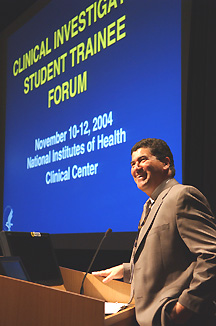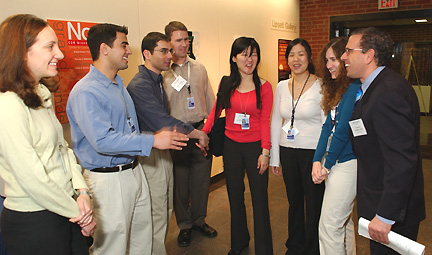
| T H E N I H C A T A L Y S T | J A N U A R Y – F E B R U A R Y 2005 |
|
|
|
ON THE ROAD TO CLINICAL AND TRANSLATIONAL RESEARCH CAREERS |
 |
|
From
one seasoned clinical investigator to the next generation:
NIH Director Elias Zerhouni spoke to the CIST Forum student attendees
about their future careers in clinical research.
|
As part of their so-called "year off" from school to engage in concentrated research, more than 250 medical and dental students converged on the NIH campus for the second annual Clinical Investigator Student Trainee (CIST) Forum.
For three days in November 2004, the students were immersed in lectures, panels, and workshops to fortify their nascent interest in becoming clinician investigators. They were invited to attend because they are currently participating in clinical and translational research fellowships—often referred to as "year-off" programs and sponsored by NIH and other academic medical centers around the country. (For info on the NIH program, visit this website.
The CIST Forum focuses on scientific advances and careers in clinical or translational research. Frederick Ognibene, director of the CC Office of Clinical Research Training and Medical Education, explains: "It’s an attempt to further capture and maintain the interest in academic careers already demonstrated by these students who have committed to a year of research in addition to their formal medical education. Hopefully, this program demonstrates that such careers can be both scientifically and personally rewarding."
 |
|
Enjoying
the company: NIH
Clinical Research Training Program students (left to right) Julie
Rosenthal, Samer
Jaber, Arash
Koochek, Robert
Allison, Sinae
Park, Chris
Keh, and Rebecca
Hommer visit with Frederick
Ognibene (far right), director of the Office of Clinical Research
Training and Medical Education, during a break in the CIST Forum program.
|
Arpi Doshi and Arash Koochek, NIH Clinical Research Training Program students, don’t need much convincing. Doshi, a student at the University of Michigan Medical School in Ann Arbor, has a strong interest in academic medicine. "Medical research is so important, yet we get bogged down in patient care. We need to step back," she observed, "and see what might make things better."
Koochek, a student at the University of Vermont College of Medicine in Burlington, already knows he will become what he calls a bridge scientist. "I am very patient-oriented but want to work with both patients and scientists. This will enhance my scientific-medical knowledge as well as my career," he said.
During the CIST Forum, established investigators representing both NIH and other academic medical centers presented their ideas and experiences in the realm of how to succeed as a physician-scientist; they also explored controversies in medicine and bioethics and translation from the bench to the bedside.
The CIST Forum is part of the thread in NIH’s Roadmap tapestry within the initiative to re-engineer the clinical research enterprise—namely, to enhance and expand the scientific workforce.
"Clearly, a goal is to have these 250 bright and energetic students continue in academic careers as physician-scientists participating in clinical research," Ognibene said. "The sponsoring partners will track the subsequent careers of the participants in the CIST Forum as they move from medical school to residencies, subspecialty training, and beyond," he said. He noted that in bringing seasoned and emerging physician-scientists together, the forum encourages and provides a base for continuing collaboration and networking.
Yale University School
of Medicine (New Haven, Ct.) student and Doris Duke clinical research fellow
Katherine Gergen-Barrett summed up her appreciation of the CIST Forum: "It
is all about empowerment." ![]()
| For More Information . . . |
|
CIST Forum partners include NIH, the Howard Hughes Medical Institute, the Doris Duke Charitable Foundation, and the Sarnoff Endowment for Cardiovascular Science. For more information on clinical research training opportunities at NIH, contact the Clinical Center's Office of Clinical Research Training and Medical Eduation at 301-496-9425 or visit online. For information
on the NIH Roadmap initiative, visit the "Re-engineering the Clinical
Research Enterprise" website.
|